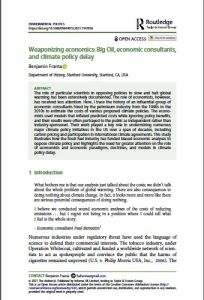Join getAbstract to access the summary!

Join getAbstract to access the summary!
Benjamin Franta
Weaponizing Economics
Big Oil, economic consultants, and climate policy delay
Taylor & Francis Online, 2021
What's inside?
Research shows that economists propped up the fossil fuel industry’s anti-climate change agenda.
Recommendation
It’s common knowledge that the fossil fuel industry has long employed scientists to bolster its anti-climate change agenda. But less well-known is how economic consultants have also influenced energy policy discussions. In this eye-opening digest of US energy policy from the 1980s through the 2010s, academic Benjamin Franta delves into the role some influential economists have played in diverting attention from the urgency of climate action. Anyone with an interest in climate economics will find valuable information in this astute work.
Summary
About the Author
Benjamin Franta is a PhD candidate at Stanford University, where he studies the history of fossil fuel producers and climate change politics. He also has a PhD in applied physics and a JD degree.



















Comment on this summary
Our abstract writers summarize reports into a concise format that is true to the original work and conveys its essential information. In this two-page summary of a report that is more than 20 pages long, they had to choose to include some topics over others. The report author explores the work of CRA in some detail, and so our abstract writer and editors opted to include it in our summary, along with another economist’s direct quotation from the report. We strive to give readers a good idea of a report's essence, and we appreciate your feedback.
Best regards,
Gaby Deponte, Managing Editor, Economics/Finance/Politics